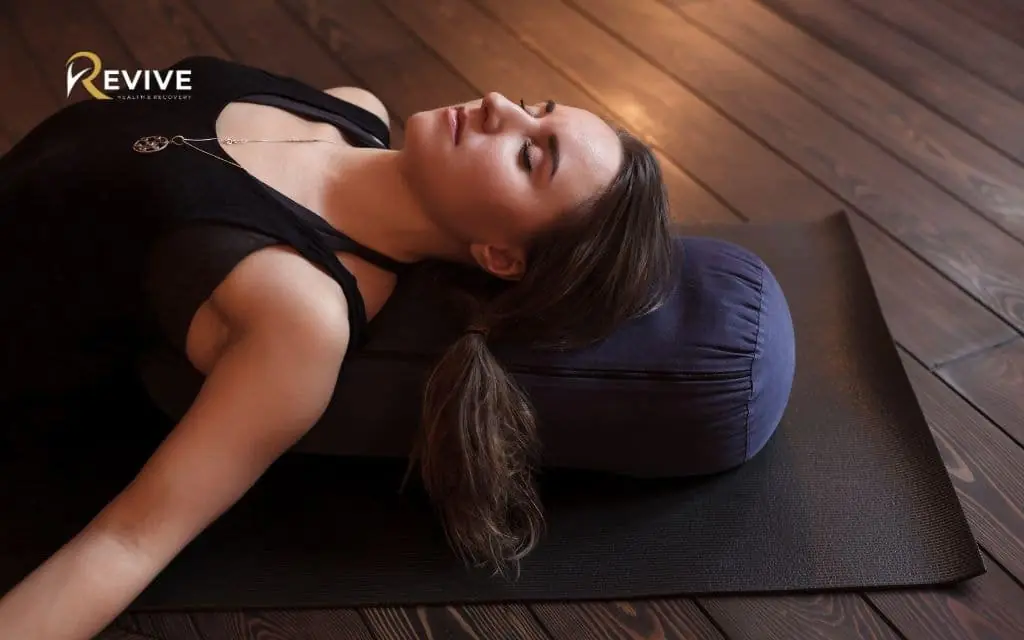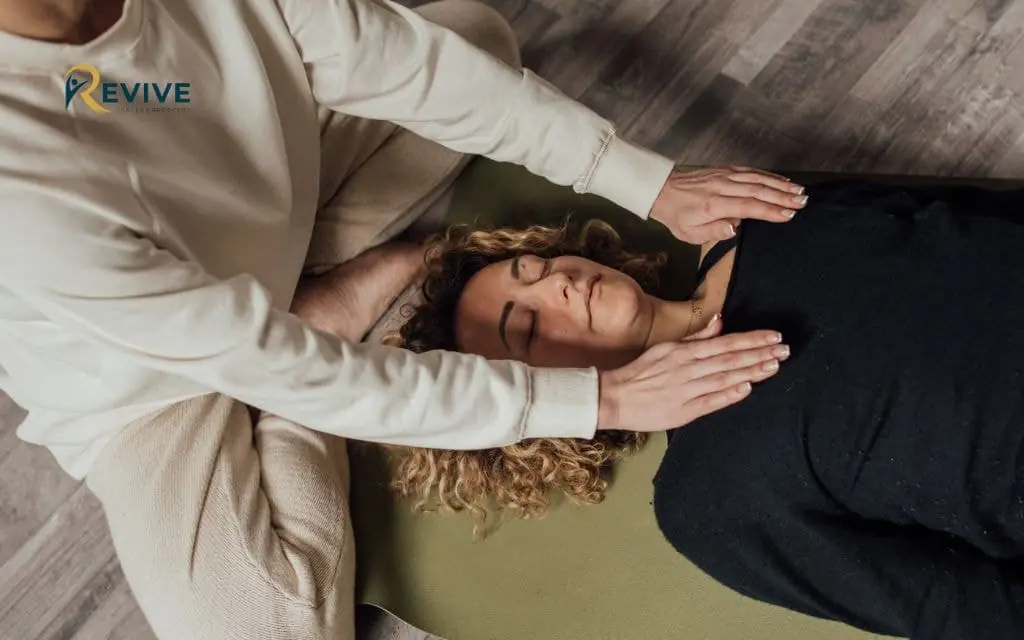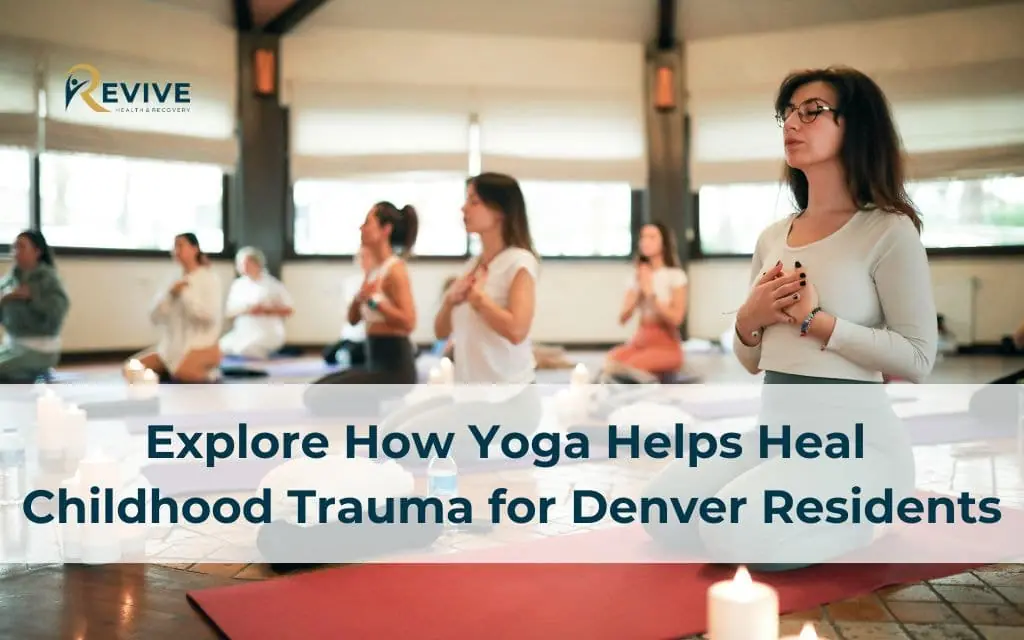Childhood trauma affects millions of Americans, with Colorado reporting that nearly 18% of children experience two or more adverse childhood experiences. These early traumas can create lasting impacts on mental health and physical well-being. In Denver, yoga has emerged as a powerful therapeutic tool for trauma recovery, offering a mind-body approach that complements traditional treatment methods.
This guide examines how yoga supports childhood trauma recovery, helps you find trauma-informed classes in Denver, and explains how to integrate this practice into your healing journey.
Understanding Childhood Trauma and Yoga’s Role
What is Childhood Trauma?
Childhood trauma encompasses experiences like abuse, neglect, household dysfunction, or witnessing violence that overwhelm a child’s ability to cope. These experiences, known as adverse childhood experiences, can alter brain development and nervous system functioning, potentially leading to long-term mental health challenges including anxiety, depression, and post-traumatic stress disorder (PTSD).
In Colorado, childhood trauma rates exceed national averages in some categories, with Denver County reporting significant numbers of children affected by adverse childhood experiences that require specialized treatment approaches.

How Yoga Helps Heal Childhood Trauma
Yoga addresses trauma through the mind-body connection, leveraging mindfulness to foster healing and emotional regulation. Trauma becomes stored in the body – creating physical tension, dysregulated breathing patterns, and nervous system disruption. Yoga directly targets these physiological manifestations through:
- Nervous system regulation: Yoga activates the parasympathetic “rest and digest” response, countering the hypervigilance common in trauma survivors
- Embodiment: Trauma often disconnects people from their bodies; yoga rebuilds this connection safely
- Controlled breathing: Pranayama techniques calm the autonomic nervous system and reduce anxiety
- Present-moment awareness: Mindfulness counters rumination about past trauma
Research from the Trauma Center at Justice Resource Institute demonstrates that yoga increases vagal tone – improving emotional regulation and stress resilience. Denver trauma specialists now regularly recommend yoga therapy for trauma as part of comprehensive treatment plans.
For those experiencing PTSD symptoms, yoga for PTSD Denver programs show particular promise. Studies indicate regular practice can reduce hyperarousal, improve sleep quality, and decrease intrusive thoughts – symptoms that often persist decades after childhood trauma occurs.
Trauma-Informed Yoga: What You Need to Know
Defining Trauma-Informed Yoga
Trauma-informed yoga differs significantly from mainstream classes. This specialized trauma-informed approach prioritizes:
- Safety: Creating predictable, consistent environments
- Choice: Offering options rather than commands
- Empowerment: Encouraging participants to honor their body’s needs
- Non-judgment: Removing performance pressure and comparison
- Invitational language: Using suggestions instead of directives
In Denver, trauma-informed yoga classes emphasize these principles while avoiding potentially triggering elements like unexpected physical adjustments, dark rooms, or demanding poses that might recreate feelings of powerlessness.
Key Components of Trauma-Informed Yoga
Effective trauma-informed yoga incorporates:
Mindful Body Awareness
Gentle scanning techniques help participants notice physical sensations without judgment – reconnecting with their bodies gradually and safely.
Breath Practices
Simple breathing exercises like extended exhales activate the parasympathetic nervous system, reducing fight-or-flight responses triggered by trauma.
Grounding Techniques
Poses that create connection with the floor help participants feel secure and present:
Mountain Pose (Tadasana)
Child’s Pose (Balasana)
Seated poses with back support
Repetitive, Rhythmic Movement
Predictable sequences help regulate the nervous system and build a sense of control.
Trauma-Release Exercises
Specific movements facilitate the discharge of stored tension in a controlled, supported manner.
Is Yoga Right for Your Trauma Recovery Journey?
Who Should Consider Yoga Therapy
Yoga therapy benefits many individuals recovering from childhood trauma, particularly:
- Adults working through childhood emotional, physical, or sexual abuse
- Those experiencing trauma-related anxiety, depression, or PTSD
- Individuals seeking body-centered healing approaches
- People who feel disconnected from physical sensations
- Those looking to complement talk therapy with somatic practices
Childhood trauma recovery yoga Denver programs serve diverse populations, from healthcare workers with secondary trauma to veterans and survivors of family violence.
When to Seek Professional Help Alongside Yoga
While yoga provides powerful support, certain situations require additional professional intervention:
- Acute mental health crises or suicidal thoughts
- Dissociative episodes during yoga practice
- Increased flashbacks or nightmares after sessions
- Persistent anxiety that worsens with body awareness

In these cases, yoga therapy for trauma Denver works best when integrated with evidence-based treatments like Cognitive Behavioral Therapy (CBT), Eye Movement Desensitization and Reprocessing (EMDR), or specialized trauma programs.
At Revive Health Recovery, our trauma specialists can help determine if combining yoga with other therapies would benefit your specific situation.
Finding the Right Yoga Classes and Instructors in Denver
How to Choose a Trauma-Informed Yoga Instructor
When seeking a trauma-informed instructor, look for:
Specialized Training
- Trauma-Sensitive Yoga certification (TCTSY)
- Yoga for Trauma and Recovery training
- Mental health credentials (when possible)
Essential Qualities
- Understanding of trauma physiology
- Respect for personal boundaries
- Willingness to adapt based on feedback
- Non-reactive presence
Questions to Ask Potential Instructors:
- “What trauma-specific training have you completed?”
- “How do you make classes accessible to trauma survivors?”
- “What boundaries do you maintain regarding physical adjustments?”
- “How do you handle potential triggers in class?”
Top Yoga Studios for Trauma Healing in Denver
Denver offers several exceptional resources for trauma-informed yoga:
Stacie Joy Yoga
- Location: South Denver
- Specialty: One-on-one therapeutic yoga tailored to individual nervous system needs
- Unique Approach: Integrates breathwork, meditation, and personalized movement sequences
Zenver Yoga + Holistic Mental Health
- Location: Central Denver
- Specialty: Women-focused healing combining yoga with somatic psychotherapy
- Unique Offerings: International healing retreats, pop-up community classes
Colorado Artists in Recovery
- Location: Multiple Denver locations
- Specialty: Donation-based, community-driven classes accessible to all income levels
- Unique Aspect: Integrates creative expression with movement for deeper healing
Booking Your First Trauma-Informed Yoga Class in Denver
Steps to Get Started
- Research options using keywords like “trauma-informed yoga classes Denver” or “yoga for PTSD Denver”
- Contact studios directly about their trauma-informed offerings
- Discuss concerns with instructors before attending
- Start with observation if participating feels overwhelming
- Consider private sessions before group classes
- Bring support like a trusted friend to early classes if needed
What to Expect:
- Instructors who explain poses clearly without demanding perfection
- Options to modify or skip any movement
- Permission to leave or take breaks when needed
- Minimal hands-on adjustments (usually only with explicit consent)
- Gradual progression from simple to more complex movements
Affordable Options for Trauma-Informed Yoga
Financial constraints shouldn’t prevent access to healing:
- Donation-Based Classes: Colorado Artists in Recovery offers pay-what-you-can sessions
- Community Classes: Many studios offer reduced-rate community classes weekly
- Insurance Coverage: Some health plans cover yoga therapy with proper documentation
- Sliding Scale: Zenver Yoga provides income-based pricing
- Online Options: Denver instructors increasingly offer affordable virtual sessions
Contact Revive Health Recovery at (303) 268-4655 for information about potential financial assistance for integrated trauma treatment.
Integrating Yoga with Professional Trauma Therapy
Why Combine Yoga with Therapy?
While yoga addresses the body’s trauma response, professional therapy for childhood trauma in Denver tackles cognitive and emotional aspects. Together, they create comprehensive healing by:
- Processing trauma memories while maintaining physical regulation
- Developing practical coping skills alongside embodied resilience
- Building insight together with somatic awareness
- Addressing both conscious and unconscious trauma effects
Research shows this combined approach significantly improves treatment outcomes, particularly for complex childhood trauma.
How Revive Health Recovery Can Help
Revive Health Recovery specializes in trauma-informed care that recognizes the value of complementary approaches like yoga. Our services include:
- Trauma-focused individual therapy
- Group therapy addressing childhood trauma
- Referrals to trusted yoga partners
- Guidance on integrating body-based practices with therapy
- Family healing programs
Our providers understand the neurobiology of trauma and work collaboratively with yoga professionals to ensure consistent, effective treatment. Contact us at (303) 268-4655 or visit our location at 1427 S Federal Blvd, Denver, CO 80219 to learn more.
Success Stories: Healing Through Yoga in Denver
Maria’s Journey: After surviving childhood abuse, Maria struggled with chronic anxiety and disconnection from her body, but found hope through healing childhood trauma with yoga and therapy. Combining weekly therapy at Revive Health Recovery with trauma-informed yoga at Zenver Yoga, she gradually developed the ability to recognize and regulate her nervous system responses. “For the first time,” she shares, “I feel like I actually live in my body rather than being at war with it.”

James’s Experience: A veteran with childhood trauma, James found that yoga helped him access emotions he couldn’t verbalize in traditional therapy. “The movement broke through barriers talking couldn’t touch,” he explains. His therapist at Revive worked closely with his yoga instructor to support this integrated approach.
FAQs About Yoga for Childhood Trauma in Denver
Is yoga safe for childhood trauma survivors?
Yes, when taught with trauma-informed principles emphasizing choice and safety. Proper trauma-informed classes in Denver create environments where survivors maintain control of their experience and practice at their own pace
How do I find affordable yoga in Denver?
Check donation-based options like Colorado Artists in Recovery, community classes at established studios, and sliding-scale offerings. Revive Health Recovery can provide current information on accessible options.
What should I expect in a trauma-informed class?
Expect clear instructions, options for all poses, permission to modify or rest, minimal hands-on adjustments, and predictable sequences. Instructors create safe environments without pressure or comparison.
Can yoga help with PTSD?
Yes, research indicates yoga reduces PTSD symptoms by regulating the nervous system, improving body awareness, and teaching self-regulation skills. Denver has specialized yoga for PTSD programs with proven effectiveness.
How do I choose the right instructor?
Look for specialized trauma training certifications, experience working with trauma survivors, and an approach emphasizing safety and choice. The right instructor welcomes questions and respects boundaries.
How soon can I see results?
While experiences vary, many report improvements in sleep quality and anxiety levels within 4-6 weeks of regular practice. More significant nervous system regulation may take several months of consistent work.
Can yoga replace therapy?
No, yoga works best as a complement to professional trauma treatment. Revive Health Recovery creates comprehensive plans that may include yoga alongside evidence-based therapies for optimal results.
Additional Resources and Support
For further exploration of trauma healing through yoga in Denver:
- Denver Trauma Support Network: www.denvertraumasupport.org
- Colorado Trauma Informed Yoga Alliance: www.cotiya.org
- Revive Health Recovery Blog: Articles on integrated trauma treatment
- The Body Keeps the Score by Bessel van der Kolk (recommended reading)
Begin Your Healing Journey Today
Yoga offers a powerful path to reconnect with your body and process childhood trauma in a safe, supported environment. Denver’s growing community of Denver trauma-informed yoga practitioners provides diverse options for every comfort level and budget.
Remember that healing happens at your own pace, and combining yoga with professional support creates the most effective recovery path. Whether you’re just beginning to explore trauma recovery or seeking to enhance your existing treatment, yoga can play a valuable role in your journey.
Ready to take the next step? Contact Revive Health Recovery at (303) 268-4655 to discuss how we can support your integrated approach to healing childhood trauma.



